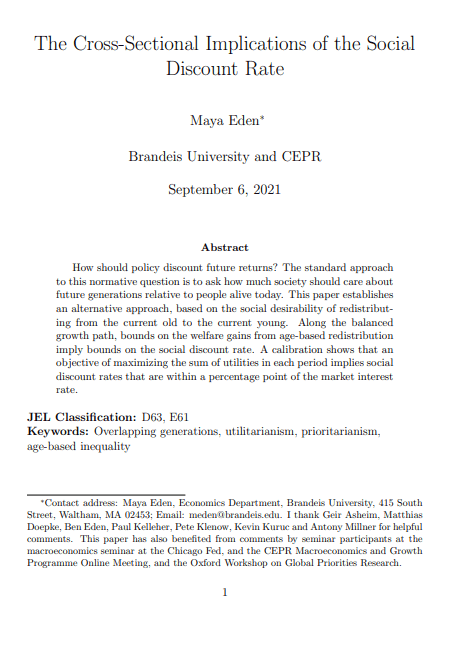The cross-sectional implications of the social discount rate
Maya Eden (Brandeis University)
GPI Working Paper No. 12-2021, published in Econometrica
How should policy discount future returns? The standard approach to this normative question is to ask how much society should care about future generations relative to people alive today. This paper establishes an alternative approach, based on the social desirability of redistributing from the current old to the current young. Along the balanced growth path, bounds on the welfare gains from age-based redistribution imply bounds on the social discount rate. A calibration shows that an objective of maximizing the sum of utilities in each period implies social discount rates that are within a percentage point of the market interest rate.
Other working papers
Calibration dilemmas in the ethics of distribution – Jacob M. Nebel (University of Southern California) and H. Orri Stefánsson (Stockholm University and Swedish Collegium for Advanced Study)
This paper presents a new kind of problem in the ethics of distribution. The problem takes the form of several “calibration dilemmas,” in which intuitively reasonable aversion to small-stakes inequalities requires leading theories of distribution to recommend intuitively unreasonable aversion to large-stakes inequalities—e.g., inequalities in which half the population would gain an arbitrarily large quantity of well-being or resources…
Evolutionary debunking and value alignment – Michael T. Dale (Hampden-Sydney College) and Bradford Saad (Global Priorities Institute, University of Oxford)
This paper examines the bearing of evolutionary debunking arguments—which use the evolutionary origins of values to challenge their epistemic credentials—on the alignment problem, i.e. the problem of ensuring that highly capable AI systems are properly aligned with values. Since evolutionary debunking arguments are among the best empirically-motivated arguments that recommend changes in values, it is unsurprising that they are relevant to the alignment problem. However, how evolutionary debunking arguments…
Staking our future: deontic long-termism and the non-identity problem – Andreas Mogensen (Global Priorities Institute, Oxford University)
Greaves and MacAskill argue for axiological longtermism, according to which, in a wide class of decision contexts, the option that is ex ante best is the option that corresponds to the best lottery over histories from t onwards, where t is some date far in the future. They suggest that a stakes-sensitivity argument…

